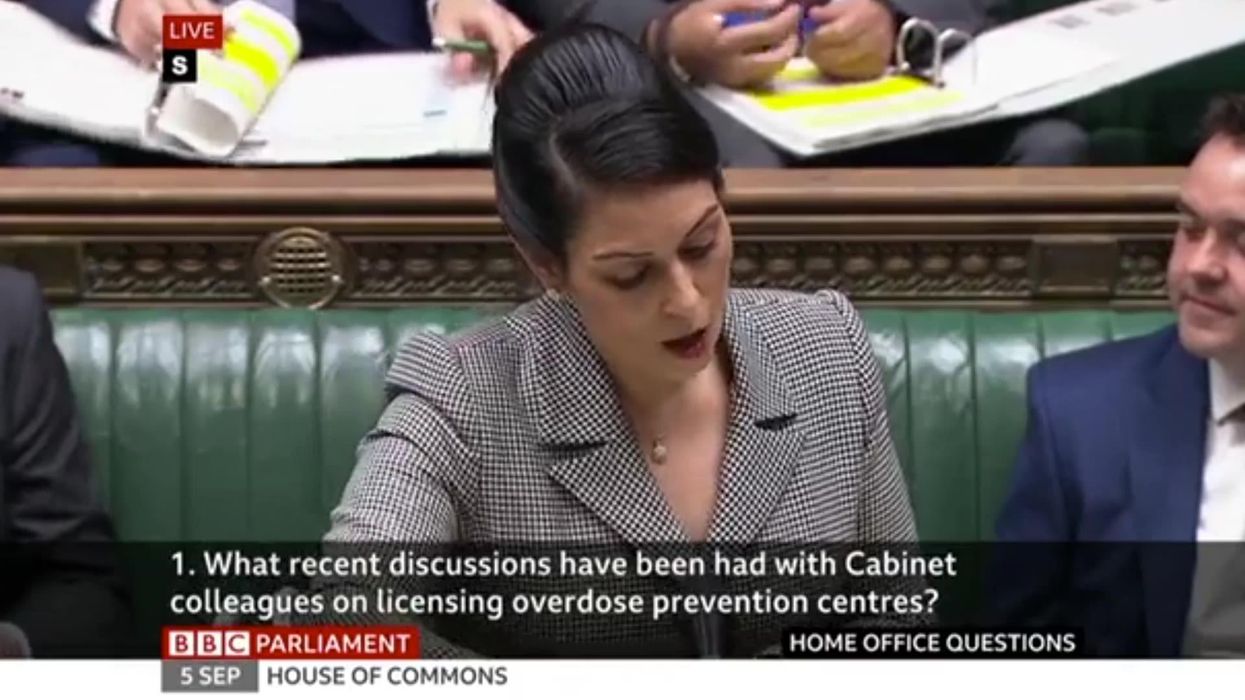Ellie Abraham
Sep 06, 2022
Priti Patel tells MPs to 'shut up' as she defends her record
BBC Parliament
In news that will have undoubtedly delighted many, Home Secretary Priti Patel quit the cabinet yesterday ahead of the incoming Prime Minister, Liz Truss taking up the role.
It has been reported that the Witham MP handed in her resignation to the outgoing Boris Johnson amid the expectation that Truss would remove her from the position on the front bench, though Patel insisted it was her choice to quit.
Patel’s tenure as Home Secretary, from July 2019 when she was appointed by Johnson, was underlined by accusations of inhumane immigration policies, bullying accusations and a host of other scandals.
Here’s a roundup of some of her worst moments at the helm of the Home Office.
Sign up to our free Indy100 weekly newsletter
1. Rwanda scheme
Possibly the most significant stain of her legacy on Britain’s history will be Patel’s Rwanda policy, in which the government plans to send people seeking asylum in the UK to Rwanda.
The plan was announced in April 2022, despite the UK High Commissioner to Rwanda urging that the country “should not be pursued as an option for the planned migration policy” due to its poor human rights record and recruiting of refugees into armed operations.
On 15 June, the first flight due to take asylum seekers to Rwanda was grounded after a last-minute intervention from the European Court of Human Rights' (ECHR).
Today, evidence presented at a High Court challenge over the agreement showed that Rwanda was initially “ruled out” of consideration for such an asylum deal by the Foreign Office. But, it was put back on the list of potential countries after “particular interest” was shown by Boris Johnson and Priti Patel.
A Government spokesperson said: “The global migration crisis needs innovative solutions, and our world-leading partnership with Rwanda is a key part of our plans to fix the broken asylum system.
"We expected legal challenges to this plan but remain committed to delivering the policy as soon as possible, so we can break the business model of people smugglers and prevent further loss of life in the Channel.
“Our thorough assessments found that Rwanda is fundamentally a safe and secure country with a strong track record of supporting asylum seekers.”
2. Saying refugees to the UK are “asylum shopping”
The Home Secretary's views on those seeking asylum are questionable, to say the least.
In February, Patel sparked controversy for remarks made during a Home Affairs Committee meeting, in which she claimed that migrants who come to the UK are “asylum shopping”.
Patel said: “The problem that we have with illegal migration, and we should be very clear about this, is that the majority of people are not fleeing persecution, they are asylum shopping and that is why they should be claiming asylum in other countries.”
3. Wanting Border Force officials to turn back boats in the Channel
Another horrific, but thankfully unachieved, part of her role was the so-called “sanction tactics” Patel wanted to approve, including allowing border forces to turn back boats carrying migrants in the English Channel.
The Home Office has argued that the small boat crisis is the fault of people smugglers and people working on the issue believed that sending boats back to France would act as a deterrent against travelling.
Dan O’Mahoney, a former commando who was appointed to deal with migrant crossings said: "People should claim asylum in the first safe country they reach. The government’s new plan for immigration will fix the system, making it firm on those who abuse it and fair on those in genuine need.
“It is critical that we have a safe and legal maritime deterrent in the channel, and our Border Force officers are authorised to use new maritime tactics.”
The perilous journey has left many migrants dead, but despite knowing this, Patel wanted Border Force officials to be able to turn the boats around and force French authorities to deal with them. But, doing so would have meant rewriting of maritime law.
4. Windrush scandal compensation scheme
Though not the architect of the Windrush scandal, Patel’s time as Home Secretary did nothing to improve the already shocking treatment British people from the Caribbean have faced at the hands of the Conservative government.
In 2017, it began to emerge that, thanks to the government’s “Hostile Environment” legislation, many people part of the Windrush generation who had legally arrived in the UK as children but whose papers were destroyed by the Home Office were falsely deemed as illegal or undocumented immigrants.
The compensation scheme formulated after this came to light has been run by Patel and she faced legal action for its failures after just 5 per cent of claimants had received the money in the four years since the scandal came to light.
A Home Office spokesperson said: “We continue to process claims under the Windrush Compensation scheme which has now paid out more than £40.5 million across 1,037 claims, with a further £8.2 million offered, awaiting acceptance or pending review.”
5. Multiple bullying accusations
In February 2020, Home Office permanent secretary Sir Philip Rutnam resigned from his position and allegedly turned down a six-figure payoff.
In a televised speech, Rutnam claimed he was constructively dismissed from the role for raising allegations about Patel bullying members of staff. It is claimed the home secretary created a culture of fear by shouting and swearing at people, belittling them and making unreasonable and repeated demands.
The independent adviser on ministerial standards Sir Alex Allan was asked to investigate and found that ‘her approach on occasions has amounted to behaviour that can be described as bullying …’ and said that her behaviour was in breach of the Ministerial Code, even if unintentionally. But Boris Johnson chose not to sack Patel – and then Sir Alex resigned in the wake of this decision.
It’s not the first time Patel has faced accusations of this type of behaviour. The BBC reports a former aide of Patel’s received a £25,000 pay-out after allegedly taking an overdose due to bullying from the then employment secretary in 2015.
6. Nationality & Borders Act
The act proposed by Patel featured some of the most anti-refugee policies the UK has seen, according to some organisations and critics.
It has introduced a two-tier asylum system, meaning those who arrive in the UK means that are not resettlement schemes (i.e. arriving across the Channel in boats) will receive less protection and support.
The act increases the level of proof needed to declare someone a refugee and reduces the level of crime for which a person may have their refugee status rescinded.
The Law Society stated concerns that the act may be “incompatible” with international law, writing: “In particular, we're concerned that penalising refugees who arrive in the UK via irregular means is incompatible with the Refugee Convention 1951.”
A Government spokesperson said: “The rise in these dangerous crossings is an overt abuse of our immigration laws and risks the lives of vulnerable people. Anyone travelling through safe countries to reach the UK should claim asylum there instead of funding criminal gangs who put profit before lives.
“Those entering the UK via illegal and dangerous means such as the Channel should expect a swift removal. Under our Migration and Economic Development Partnership with Rwanda, they will be in scope to be relocated there to have their claims considered.
“Our new Nationality and Borders Act is breaking these evil criminals’ business model, with 124 people already arrested since it became law. Alongside this, we are continuing to accelerate the returns of those who flout our laws and immigration rules.”
Update: This article was amended on 7 September 2022 to include details of Sir Alex Allan’s report into claims of bullying. The article previously inaccurately stated that in April Ms Patel had been cleared of bullying.
Have your say in our news democracy. Click the upvote icon at the top of the page to help raise this article through the indy100 rankings.
Top 100
The Conversation (0)














